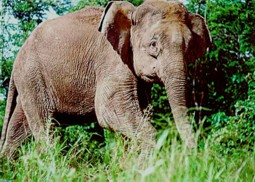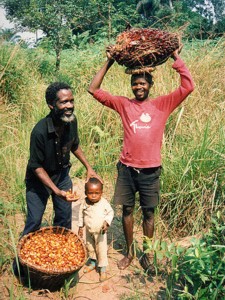Palm oil - the killer oil
What is Palm Oil?
Palm Oil is a form of edible vegetable oil obtained from the fruit of the African oil palm tree (Elaeis guineensis).
African Oil palms originated in West Africa, but can flourish wherever heat and rainfall are abundant.

Oil from palm is the most productive oil seed in the world. A single hectare of oil palm may yield 5,000 kilograms of crude oil, or nearly 6,000 litres of crude oil. For comparison, soybeans and corn—crops often heralded as top biofuel sources—generate only 446 and 172 litres per hectare, respectively.
Palm oil is now the second most widely produced edible oil. Palm oil is found in many everyday products including biscuits, crackers, batters, chips, shampoo, skin care and beauty products, in different varieties of pet food, to name a few.
It is also found in a wide array of products sold in natural food stores. Palm Oil is also used as a biofuel and the demand for this fuel alternative is adding to the problem.
Devastating impacts
Over 85% of the world's palm oil comes from Malaysia and Indonesia.
An estimated 40% of food on our supermarket shelves contains palm oil.
In SE Asia alone, the equivalent of 300 football fields are deforested every hour for palm oil production.
Palm oil typically costs the lives of up to 50 Orang-utans each week.
Australians unknowingly consume on average 10 kilograms of palm oil each year because we do not currently have the ability to exercise consumer choice.
Deforestation is a major contributor to Global Warming.
Don't Palm Us Off - Zoos Australia
Why is it popular?
In the recent wave of trying to avoid trans-fatty acids, the processed-food industry has turned to palm oil as an alternative for partially hydrogenated oil. Tragically, this substitute is a far from healthy option if you are an orangutan. It is not good for human health or the environment either… Biomedical research indicates that the consumption of Palm Oil increases the risk of heart disease.
Palm oil production has been blamed for the rapid destruction of rainforest habitats and remained the single greatest threat to the existence of orang utans, and many other wildlife species.
Many people believe that we humans are the centre of the planet, just like people believed the Earth was the centre of the Solar System. The Church has also been guilty of reinforcing this attitude. This is genocide and eco-destruction!
Eating ethically
Only 3 vegetable oils must be labelled in food products in Australia and New Zealand. Those are peanut oil, sesame oil and soy bean oil. In the USA, manufacturers are required to label Palm Oil on their products.
If the label states vegetable oil and then goes on to state the amount of saturated fat you can count on that vegetable oil being either palm kernel oil, palm oil or coconut oil. In cosmetics, it is labelled as Elaeis guineensis. The first thing to do is avoid these products.
Sodium Laureth Sulphate (can also be from coconut)
Sodium Lauryl Sulphates (can also be from ricinus oil)
Sodium dodecyl Sulphate
(SDS or NaDS)
Palmate
Palm Oil Kernal
Palmitate
Manufacturers being members of the Roundtable on Sustainable Palm Oil doesn't necessarily mean that they are sourcing certified sustainable palm oil!
Here in Australia, however, current labelling laws allow manufacturers to disguise Palm Oil as vegetable oil.
Our government needs to make sure that we are not unwillingly buying and eating palm oil, and we can help by buying ethically.
Truth in Labelling
(This website has been established by Senator Nick Xenophon in conjunction with the Citrus Reform Association. )
Extinctions
Estimates show that if something isn’t done soon to stop the spread of palm oil plantations into the forests that harbour Sumatran and Bornean orangutans, they will be extinct in twenty years.
There are fewer than 2000 Borneo Elephants (Elephas maximus borneensis) left in the wild. These endangered animals are threatened by the clearing of lowland forest for agriculture, particularly palm oil plantations.

Human plague
As the increasing human population takes an ever greater share of the Earth’s net primary productivity, less and less is left for all other species. So forests are converted to farmland and palm-oil plantations, destroying the habitats of ever more creatures. We will continue destroying the environment in a desperate attempt to maintain our high energy lifestyles, endless growth, and/or overpopulated numbers of people.
PNG has an estimated population growth rate of 3.2%. Further environmental degradation and deforestation from large-scale agriculture projects such as oil palm will lead to poverty and increasing conflicts in PNG.
Instead of controlling the environment for the benefit of the population, maybe we should control the population to ensure the survival of our environment.
– Sir David Attenborough, The Life of Mammals
Sample letters
SAMPLE LETTERS to take action

Photo: Palm nuts grow in bunches just under the fronds on the tree. Nuts are harvested using a belt to scale the tree. Once removed from the bunch, the nuts are boiled and the oil is extracted from the fibers in the nut.
(Photo source: Wikimedia commons)

Recent comments